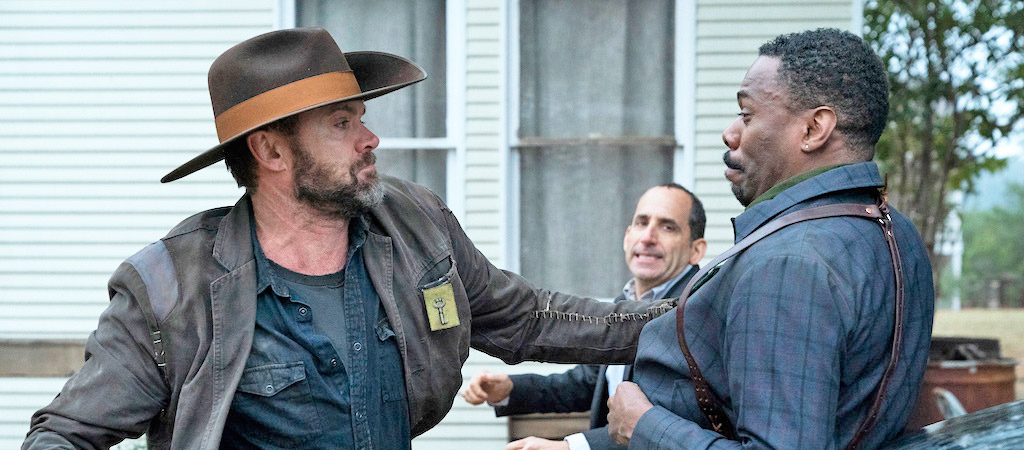Because of when this season of Fear the Walking Dead was interrupted by the pandemic, tonight’s seventh episode will be the midseason finale (the midpoint is usually episode 8). Without spoiling anything, the end of this week’s episode works well as a midseason finale, even if it was unintentional. I find myself incredibly excited for the back half of the season in 2021, the seventh season, and beyond.
It’s a strange thing to say given how well The Walking Dead has rebounded under new showrunner Angela Kang, even after the loss of Andrew Lincoln, but this season of Fear is every bit as good as any seven-episode stretch of The Walking Dead. That is not hyperbole. Check any of the fan forums, where viewers of Fear the Walking Dead were absolutely brutal to the series last year, and you’ll see how truly excited fans are about this series again.
Lennie James has been with The Walking Dead universe since the very first episode, and he’s never been as good as he is now, and there are a few characters on Fear that now rival Carol, Daryl, and Maggie as the best of the TWD: Colman Domingo’s Strand, Garrett Dillahunt’s John Dorie, and Alycia Debnam-Carey’s Alicia. That’s not to mention Rubén Blades’ fan-favorite character Daniel Salazar, and a strong supporting cast that includes Austin Amelio’s Dwight (over from the parent series), Maggie Grace’s Althea, and even Jenna Elfman’s character, June, who — until this sixth season — had become one of the most disliked characters since Lori Grimes.
What’s so interesting about the drastic shift in the quality of the show from Season 5 to Season 6 is that there has not been a creative shakeup either behind the camera or in front of it. There have been a couple of new writers, but five of the seven episodes (so far) were written by the same people who wrote last year’s episodes, and the only additional director this season has been Lennie James himself, who directed the season’s third episode. It’s virtually the same cast, the same writers, and the same directors, and yet this season is dramatically better than last.
Why?
Entertainment Weekly interviewed showrunners Andrew Chambliss and Ian Goldberg about that very question, and the two were very careful not to trash last season. They insist they are “proud” of all the episodes they have done, but they are glad that fans seem so much more receptive to season six. Ultimately, however, Andrew Chambliss attributes it to the fact that they are telling the kinds of stories they like to tell now:
I think the storytelling that we’re doing season 6 is kind of our favorite kind of storytelling to do, which is focusing on characters and taking them in a complete journey within each episode. And I think we’ve said this before, but our favorite episodes of The Walking Dead are the ones that do that.
And I think because we are telling these kinds of stories that we love to tell as we were looking at season 6, as it was all kind of coming together and we were getting cuts and we were getting scripts that we felt really good about it.
Meanwhile, they don’t quite come out and say it as such, but they do suggest that Season 6 wouldn’t have been as good as it has been if Season 5 hadn’t sucked, although they don’t say “sucked.” They say “a place of hope and triumph”:
Season 5 was an unusually bright and optimistic and kind of benevolent vibe… By the end of the [fifth] season, the goal was to sort of rip the rug out from under everybody. And that started to happen when we introduced Virginia and her group, and really kind of had a finer point on it in the finale when Morgan was shot and everyone was separated from each other.
So we kind of feel like we couldn’t have had the character shifts in season 6 and that reinvention and new tone and new journeys that people are grappling with, unless we brought them to a place of complete hope and triumph.
I believe that Chambliss, Goldberg, and the writers cracked the code on this kind of storytelling, which — as they say in the interview — is the opposite of what we hear so many other showrunners say about their shows these days. It’s very common for showrunners to say that their seasons are like very long, 8, 10, 13-hour movies. “I think we’re kind of doing the opposite,” Goldberg says, “where yes, that’s the case, but each episode is its own movie”:
The Walking Dead universe has been operating in 8-episode arcs for so long now that it may have forgotten the importance of a good, self-contained episode. Goldberg and Chambliss have managed to revive Fear the Walking Dead by going back to the basics of network television. It’s never been better, and if it can somehow keep this up, Fear may have a few seasons left in it after all.
Source: EW







